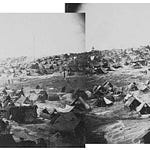Published on October 15, 2028 (Episode 428)
Introduction
At the outbreak of the American Revolution, the British Empire stretched across nearly every corner of the globe. From India to the Caribbean, from Africa to Gibraltar to the Canadian provinces, Britain’s reach was vast. In 1776, the thirteen colonies that chose to rebel represented only half of the empire’s provinces. The other half—places like Quebec, Nova Scotia, Jamaica, and Bermuda—remained loyal to the Crown. But why? Why did some colonists believe their grievances justified independence, while others–who were often similarly aggrieved–chose not to revolt?
To answer this, Trevor Burnard and Andrew Jackson O’Shaughnessy invite us to see the Revolution not just as a national story of the United States, but as part of a larger imperial crisis that spanned the globe. Britain’s challenge was to govern an array of distant, diverse territories during a period of reform and unrest. Turning our attention to colonies that stayed within the empire, we gain a more complex perspective. The Revolution was not only about republicanism, liberty, and democracy; it was also about empire, and the different ways colonial societies and elites responded to imperial governance.
About the Guests
Trevor Burnard (1957–2024) was Wilberforce Professor of Slavery and Emancipation at the University of Hull and Director of the Wilberforce Institute. His scholarship illuminated the history of the Caribbean and Atlantic empires, particularly slavery and plantation societies.
Andrew Jackson O’Shaughnessy is Professor of History at the University of Virginia and the author of prizewinning studies including The Men Who Lost America: British Leadership, the American Revolution, and the Fate of the Empire (Yale University Press, 2014). This is his second appearance on Historically Thinking.
For Further Investigation
Trevor Burnard & Andrew Jackson O’Shaughnessy, Republic and Empire: Crisis, Revolution, and America’s Early Independence (Yale, 2025)
Andrew Jackson O’Shaughnessy, The Men Who Lost America: British Leadership, the American Revolution, and the Fate of the Empire (Yale University Press, 2014)
Trevor Burnard, Mastery, Tyranny, and Desire: Thomas Thistlewood and His Slaves in the Anglo-Jamaican World (North Carolina, 2004)
David Armitage, The Ideological Origins of the British Empire (Cambridge, 2000)
Brendan McConville, The King’s Three Faces: The Rise and Fall of Royal America, 1688–1776 (North Carolina, 2007)
Related Episodes
“The Family That Lost America”—the Howe family, both seeking peace with the American colonies and waging war with them
“The American Revolution in Habsburg Lands”—some of the curious connections between the American Revolution and distant European places
Reflection Questions
1. Why did some colonies choose rebellion while others remained loyal?
2. How does a global view of the Revolution change our understanding of its causes?
3. What lessons can we draw from the grievances of Jamaica or Nova Scotia compared with those of Virginia or Massachusetts?
Share this with someone who thinks that the American Revolution was fought only in America and had no global connections.
Tags
American Revolution; British Empire; Loyalism; Imperial History; Historically Thinking











